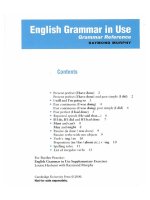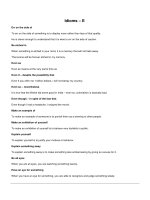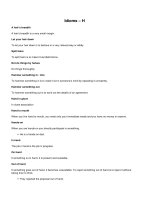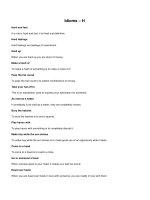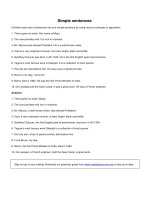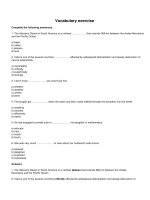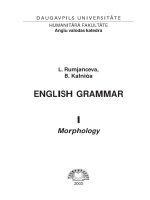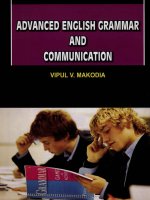English-Grammar
Bạn đang xem bản rút gọn của tài liệu. Xem và tải ngay bản đầy đủ của tài liệu tại đây (476.02 KB, 50 trang )
HCMC University of Education VB2 Preparation Course
Department of English
CHỦ ĐỀ 1 : TENSES
Thì Thể năng động Thể bị động
S V O
S be V
3
by O
1.
Simple
present
( Hiện
tại đơn)
Công thức Cách dùng Ví dụ
S + am / is / are + V
3
+ by O
Ex : He visits his grandfather
every week
His grandfather is visited
(by him) every week
Khẳng định :
S + am / is / are
S
ít +
V
s /es
S
nhiều +
V
bare
Phủ định :
S + am/ is/ are + not
S
+
don’t / doesn’t
+
V
bare
Nghi vấn :
Am/ is/ are + S….
Do/ Does + S+ Bare …?
- Dấu hiệu :
everyday, always,
sometimes, usually,
seldom…
- Các trường hợp V
es
Khi V
tận cùng bằng
O (goes) , S ( kisses),
Ch( watches) , X , Z
Sh ( washes),
( buzzes)
- 1 thói quen trong
hiện tại
- Một sự thật luôn
đúng, một chân lí
- Nói về thời gian
biểu, chương trình
- Dùng trong
mệnh đề thời gian
khi diễn tả một sự
việc tương lai
- My father drinks
coffee every
morning.
- Water boils at
100 degrees
Celsius
- The sun rises in
the East
- What time does
the film begin?
- The train leaves
London at 10:30
- When you see
him tomorrow,
remember me to
him
2.
Present
cont.
(Hiện
tại tiếp
diễn)
S + am/is/are + V
ing
- Dấu hiệu : now, at
the moment, at
present,
Look!, Listen! Hurry
up ( đầu câu)
- Một số V không
được dùng tiếp diễn :
+ V tri giác (see,
hear,feel taste, smell)
+ V chỉ cảm xúc
(love, like, hate,
want…)
+ V chỉ ý nghĩ, nhận
thức (know, forget,
understand, think,
remember, believe…)
+ V chỉ sở hữu (own,
have, belong, possess)
- Một sự việc
đang diễn ra ngay
lúc nói
- Một xu hướng
trong hiện tại
- Hiện tại tiếp
diễn dùng với
always,
continually,
constantly diễn tả
sự than phiền
- 1 dự định trong
tương lai gần
(thường kèm theo
thời gian tương lai
: next,
tomorrow….)
- I’m learning
English now
- The population
of the world is
rising very fast
- He’s always
borrowing money
from me
- I’m meeting
Tom at 10 o’clock
tomorrow
S + am/ is/ are + being + V
3 +
by O
Ex : My sister is making a cake
now.
A cake is being made by
my sister now.
Trang 1
HCMC University of Education VB2 Preparation Course
Department of English
3.
Present
perfect
(Hiện
tại hoàn
thành)
S+ have / has +V
3
Dấu hiệu
For , since , just
up to now, up till
now, recently,
already, so far, yet,
never, ever, lately…
- Một hành động
đã xảy ra trong
quá khứ và kéo
dài tới hiện tại (có
thể kéo tới tương
lai)
- Một hành động
đã xảy ra nhưng
không nói rõ thời
gian
- I have learnt
English for 7
years
- Some one has
stolen my bike
S + have/ has + been+ V
3
+ by O
Ex: They have built a new house
A new house has been
built.
4.
Present
perfect
cont.
(HTHT
tiếp
diễn)
S+ have/has+been +V
ing
( Các dấu hiệu giống
như Hiện tại hòan
thành)
- Nhấn mạnh tính
chất liên tục của
một hành động từ
lúc bắt đầu tới lúc
nói
- I have been
waiting here for 2
hours
S+ have/ has + been + being + V
3
Ex: He has been writing his
report for 2 hours
His report has been being
written for 2 hours.
5.
Simple
past
(Quá
khứ
đơn)
S+ V
2
/ V-ed
Dấu hiệu : last, ago,
yesterday…
- Một hành động
đã hoàn tất trong
quá khứ
- I saw him last
night
S + was/ were + V
3
Ex: Some one stole my bike last
week.
My bike was stolen last week.
6.
Past
cont.
(Quá
khứ tiếp
diễn)
S + was/ were + V-ing
Dấu hiệu : when,
while, as soon as,….
- Một hành động
đang diễn ra tại
một thời điểm
trong quá khứ
- Một hành động
quá khứ đang diễn
ra thì một hành
động khác cắt
ngang
- Hai hành động
quá khứ cùng diễn
ra song song
- Một hành động
quá khứ diễn ra có
tính chất kéo dài
( có all, during…)
Ex: I was sleeping
at this time
yesterday
afternoon
Ex: When I woke
up, it was raining
heavily
Ex: While I was
washing clothes ,
my sister was
cooking dinner
Ex: It was raining
all night last night
S + was/ were + being + V
3
Ex : He was writing the report at
this time yesterday
The report was being
written at this time
yesterday.
7. - Khi có 2 hành Ex: Yesterday,
Trang 2
HCMC University of Education VB2 Preparation Course
Department of English
Past
perfect
(Quá
khứ
hoàn
thành)
S + had + V
3
Dấu hiệu : by the
time, before, after,
when ….
động trong quá
khứ, HĐ nào xảy
ra trước -> dùng
past perfect, xảy
ra sau -> dùng
simple past
- Một hành động
hoàn tất trước một
thời điểm trong
quá khứ
when I came ,
they had gone
Ex: Yesterday I
had arrived home
before sunset
S+ had been + V
3
Ex: I had finished my homework
before last Monday.
My homework had been
finished before last
Monday.
8.
Simple
future
(Tương
lai đơn)
S + will/ shall + bare
Dấu hiệu : perhaps,
probably, soon,
tomorrow, next….
- Một dự đoán
tương lai
- Một hành động
tương lai được
quyết định ngay
trong lúc nói
Ex: I think It’ll
rain tomorrow
Ex: I’ll see you
next week
S + will/ shall + be + V
3
Ex : She will make the cake
The cake will be made.
9.
Near
future
(Tương
lai gần)
am
S+ is + going to + bare
are
- Một ý định
- Một khả năng
chắc chắn sẽ xảy
ra ( có căn cứ)
- I’m going to buy
a new raincoat
- Look at dark
clouds! It’s going
to rain
S + am/is/ are+going to be + V
3
10.
Future
cont.
Tương
lai tiếp
diễn
S + will be + V-ing
Một hành động sẽ
đang diễn ra tại
một thời điểm
trong tương lai
Ex: This time
tomorrow
afternoon , I’ll be
cleaning the floor
S + will be + being +V
3
11.
Future
perfect
(TL
hoàn
thành)
S + will have +V
3
Dấu hiệu : by + thời
gian trong tương lai
Một sự việc sẽ
xảy ra hay hoàn
tất tại một thời
điểm trong tương
lai
Ex : I’ll have
finished this
report by
tomorrow
S + will have been +V
3
Modals
will / would
can / could
may / might
S + must + bare
have to / has to
ought to
need to
Tình huống trong quá
khứ :
Modal + have + V
3/ed
Ex :
+ must have V
3
: ắt
hẳn đã
+ Should have V
3
: lẽ
ra nên
will / would
can / could
may / might
S + must + be + V
3
have to / has to
ought to
need to
Lưu ý : need to be V
3
= need + V
ing
Ex : You have to do your home work
Your home work has to be
done.
You need to wash your clothes
Your clothes need to be
washed
Your clothes need washing
Trang 3
HCMC University of Education VB2 Preparation Course
Department of English
Lưu ý : * sau When / after/ until/ as(soon as) … -> các thì tương lai lùi về các thì Hiện tại tương ứng
Ex : When you see him tomorrow, he will tell you everything
(simple future -> simple present)
* Khi gặp dạng câu tường thuật : lùi thì
Simple present -> simple past
Simple past -> past perfect
Past perfect -> past perfect
Ex : He said he had visited them last year
CHỦ ĐỀ 2 : CÁC DẠNG BỊ ĐỘNG
S V O
Trang 4
1.
HCMC University of Education VB2 Preparation Course
Department of English
S be V
3/ed
(by O)
Lu ý : a) Thay i S v O ỳng nguyờn tc
Subject Object
I Me
We Us
You You
They Them
He Him
She Her
It It
John Him
Mary Her
b) ễn li cu trỳc b ng trong tng thỡ
Active Passive
S + V (s, es) + O S + am / is/ are + p.p
S + V(ed) + O S + was / were + p.p
S + am/ is /are/ was/ were + V-ing S + am/ is / are/ was/ were + being + p.p
S + have / has / had + p.p S + have / has / had + been + p.p
S + modal verb + V S + modal verb + be + p.p
B ng hai tỳc t ( Thng gp vi cỏc Verb : give, send, show, lend, bring, buy)
S V O
ngi
O
vt
Cỏch 1 : S
ngi
be V
3
O
vt
by
Cỏch 2 : S
vt
be V
3
to/ for O
ngi
by ..
Lu ý : bring, send, show, give, lend -> to / buy -> for
Ex : Mary gave me a book
I was given a book by Mary
A book was given to me by Mary.
Active Passive
S
1
+ V
1
+ (that) + S
2
+ V
2
know
think
believe
report
say
* Cỏch 1 : It + be
(thỡ cuỷaV1
)
+ p.p
(V1)
+ that + S
2
+ V
2
* Cỏch 2 :
S
2
+ be
(thỡ cuỷaV1)
+ p.p
(V1)
+ to-inf
(cuỷa V2)
[V
1
vaứ V
2
cuứng baọc thỡ]
S
2
+ be
(thỡ cuỷaV1)
+ p.p
(V1)
+ to have p.p
(cuỷa V2)
[V
1
vaứ V
2
leọch baọc thỡ]
Ex :1/ They think that she is innocent.
-> It is thought that she is innocent.
-> She is thought to be innocent.
2/ They rumored he was living there.
-> It was rumored that he was living there.
-> He was rumored to be living there.
3/ They have known that he left England.
-> It has been known that he left England.
-> He has been known to have left England.
Cõu b ng vi Infinitive v gerund
* To inf -> To be V
3/ ed
* V-ing -> Being V
3/ ed
Trang 5
Cú th b by + O nu gp : someboby,
someone, people, hoc cỏc i t nh me, you,
him, her
2.
3.
4.
HCMC University of Education VB2 Preparation Course
Department of English
Ex : We dislike being cheated
I don’t want to be laughed at.
Causative (khi muốn nói rằng chúng ta để cho ai / nhờ ai/ yêu cầu ai làm việc gì,chứ không tự tay chúng ta
làm)
Ex : We had them paint our house / We got them to paint our house
We had our house painted / We got our house painted
Trang 6
Have + sb + Bare Get + sb + to-inf
Have + sth + V
3/
ed Get + sth + V3/ ed
5.
=
HCMC University of Education VB2 Preparation Course
Department of English
CHỦ ĐỀ 3 : REPORTED SPEECH
Các bước đổi :
1. Đổi động từ dẫn
2. Bỏ dấu : , “ ” , ? , please
3. Đổi đại từ nhân xưng làm chủ từ, tính từ sở hữu, tân ngữ ( theo bảng qui tắc 1)
4. Đổi thì ( theo bảng qui tắc 2)
5. Đổi trạng ngữ chỉ thời gian và nơi chốn ( theo qui tắc 3)
Lưu ý : * gạch dưới từ cần đổi
* bỏ do/ does/ did ở câu tường thuật của câu hỏi
Cấu trúc
A. IMPERATIVE ( thể mệnh lệnh)
Ex : She said to John :” Show me your paper”
She told John to show her his paper
Ann said to him : “ Don’t wait for me if I am late”
Ann told him not to wait for her if she was late
B. STATEMENTS
Ex : “I saw her this morning”, he said
He said that he had seen her that morning
Mary said to Bill, “ I don’t like living here”
Mary told Bill she didn’t like living there
C. QUESTIONS
1. YES – NO QUESTION
Ex:“ Does your brother live in London, Nam?,she asked
-> She asked Nam if his brother lived in London
2. WH- QUESTION
Ex : The boy asked me, “ What time is it?”
-> The boy wanted to know what time it was
Lưu ý : Tùy theo ý nghĩa trong câu trực tiếp, chúng ta có thể chuyển sang cách nói gián tiếp bằng một số
cấu trúc sau
Nhóm đi với to-inf Nhóm đi với V-ing
Advise (khuyên)
Warn (cảnh báo)
Remind ( nhắc nhở)
Promise (hứa) + ( O ) + to -inf
Invite ( mời)
Encourage ( khuyến khích)
Ask (yêu cầu)
Agree ( đồng ý)
Accuse sb of + V-ing ( buộc tội)
Admit + V-ing ( phủ nhận)
Suggest + V-ing ( đề nghị)
Apologize for + V-ing ( xin lỗi)
Thank for + V-ing ( cảm ơn)
Blame sb for V-ing ( đổ thừa)
Congratulate sb on + V-ing ( chúc mừng)
Insist on + V-ing ( khăng khăng)
Warn sb against V-ing (khuyến cáo ai đừng làm gì)
Prevent/ stop sb from + V-ing ( ngăn cản ai không được
làm gì)
Trang 7
S + told / asked + O + (not) to- inf
S
1
+ said ( that) + S
2
+ V
S
1
+ told + O + S
2
+ V
asked
S + wanted to know +O + if/ whether + S + V
wondered
asked
S + wanted to know + O + Wh -word + S + V
wondered
HCMC University of Education VB2 Preparation Course
Department of English
Ex : @“ We’ll come back again”
-> They promised to come back again.
@ “You’d better get up early”
-> He advised me to get up early.
@ “Could you close the window?” John said
to Peter
-> John asked Peter to close the door
@ “Remember to lock the door ” my sister
said
-> My sister reminded me to lock the door
@ “Come and see me whenever you want”
-> She invited me to come and see her
whenever I wanted
Ex :
@ “I hear you passed the exam. Congratulations!” John said
to us
-> John congratulated us on passing our exams
@ “I’m sorry I’m late” Mary said
-> Mary apologized for being late
@ “You stole my watch” the man said
-> The man accused me of stealing his watch.
@ “I’ve lost your letter” he said
-> He admitted losing my letter
@ “ I didn’t break your window”
-> He denied breaking my window
BẢNG NGUN TẮC ĐỔI
1. Personal pronouns
Subject Object
Possessive Adj (
tính từ sở hữu)
Ngơi Lưu ý
I Me My 1
Đổi theo người
nói ( chủ từ)
We Us Our 1
You You Your 2
Đổi theo người
nghe ( tân ngữ)
They Them Their 3
Khơng thay đổi
He Him His 3
She Her Her 3
It It Its 3
John Him His 3
Mary Her her 3
2. Tense
Simple present V
1/ s/ es
Simple past V
2/ ed
Present cont. Am/ is/ are + V-ing Past cont. Was/ were + V-ing
Simple past V
2/ ed
Past perfect Had + V
3/ ed
Present perfect Have/ has + V
3/ed
Past perfect Had + V
3/ ed
Will / shall/ can Would/ should / could
Must Had to
Must not Was/ were not to
Needn’t + V Didn’t have to + V
Lưu ý :
* Trong ngoặc là câu điều kiện loại 2, 3 hoặc điều ước ngược thực tế trong hiện tại hoặc quá khứ ,khi thuật lại ta vẫn giữ
nguyên thì
Ex: He told me :“If she knew the truth , she would be unhappy” -> He told me that if she knew the truth,she would be unhappy
* Trong ngoặc diễn tả 1 sự thật luôn đúng,khi mở ngoặc vẫn giữ nguyên thì
Ex: He said : “The earth revolves around the sun” -> He said that the earth revolves around the sun
* Nếu V dẫn ở thì simple present , present cont., present perfect , simple future khi mở ngoặc ta không thay đổi thì
Ex: The doctor says : “You have to stay in bed” -> The doctor says that I have to stay in bed
3. Adv of time,place
Now -> then yesterday-> the previous day / the day before
last week-> the week before tomorrow-> the day after / the following day/ the next day
next week-> the week after here -> there
today -> that day
Trang 8
HCMC University of Education VB2 Preparation Course
Department of English
CHỦ ĐỀ 4 : RELATIVE CLAUSE
person + who + V
(whom) + S + V
Thing + which + V
(which)+ S + V
Time + when ( lưu ý when = in/ on/ at which)
Ex : I still remember the day when we first met
(= on which)
Place + where ( lưu ý where = in/ on/ at which)
Ex : This is the place where the plane crashed.
( = at which)
The reason why
Ex : I don’t know the reason why he said goodbye.
( = for which)
N + whose + N (sở hữu)
Ex : This is the woman whose son won the prize
What ( the thing which) -> thay cho “một điều nào đó”
Ex : I don’t know what he wants
S+V , which … ( trường hợp này which thay cho cả mệnh đề
phía trước)
Ex : I failed the exam, which made me sad
“That” có thể thay thế cho “who, whom, which” trong MĐQH xác định ( Noun chưa rõ ràng)
Ex : The woman who/ that lives next door is a doctor
Nếu danh từ rơi vào các trường hợp sau thì phải có dấu phẩy trước who, whom, which ( trong trường
hợp này không được thay thế bằng THAT)
• N là danh từ riêng
• N có this, that, these, those
• N có my, your, his , her…
Ex: This is Ms Roger, who’s joining the firm next week.
NHữNG TRƯờNG HợP DÙNG THAT
• N hỗn hợp (cả người + vật)
• N có so sánh nhất, the first, the last…
• Sau các từ bất định như all, every(thing), some(thing), any( thing), no(thing)…
Ex : She is the kindest person that I’ve ever known
KHÔNG ĐƯỢC DÙNG THAT
• sau dấu phẩy
• sau giới từ
Ex : This is John, whom I am talking about
That
This is John, about whom I am talking
That
( Khi cần dùng một giới từ trước đại từ quan hệ, thì chỉ dùng giới từ + whom/ which ( không dùng who
/ that )
Trang 9
HCMC University of Education VB2 Preparation Course
Department of English
THAY THế MĐQH
- Nếu Verb ở MĐQH ở năng động -> bỏ who, whom, which, that và dùng hình thức V-ing
- Nếu Verb ở MĐQH ở bị động -> bỏ who, whom, which, that và dùng hình thức V
3/ed
- Nếu N trước MĐQH có the last, the second… so sánh nhất
* rút gọn MĐQH bằng to-inf ( nếu câu năng động)
* Rút gọn MĐQH bằng to be V
3/ ed
( nếu câu bị động)
Ex : 1. I live in a house which was built 30 years ago
I live in a house built 30 years ago
2. The boy who is playing guitar is Ben
The boy playing guitar is Ben
3. The first person that we must see is Mr. Smith
The first person to see is Mr. Smith
4. This is the second person who was killed in that way
This is the second person to be killed in that way
Trang 10
HCMC University of Education VB2 Preparation Course
Department of English
CHỦ ĐỂ 5A : CONDITIONAL SENTENCES
1. Conditonal sentence type 1 : Diễn tả một điều kiện có thể thực hiện được hoặc có thể xảy ra.
Ex : Give me money, I’ll buy you some good books
If you give me money, I will buy you some good books
2. Conditonal sentence type 2 : Diễn tả một điều kiện ngược thực tế trong hiện tại
Ex : He doesn’t get married. He feels lonely. ( Câu đề dùng thì hiện tại)
If he got married, he wouldn’t feel lonely
3. Conditonal sentence type 3 : Diễn tả một điều kiện ngược thực tế trong quá khứ
L ưu ý : Trong câu điều kiện loại ba, nếu bỏ từ If thì phải đảo ngữ
Ex : They had no raincoats. They got wet. ( Câu đề dùng thì quá khứ)
If they had had raincoats , they wouldn’t have got wet.
= Had they had raincoats, they wouldn’t have got wet.
* Ngoài liên từ “if” ra, câu điều kiện còn được bắt đầu bằng các liên từ khác như : suppose, supposing
that (giả sử như), on the condition that (với điều kiện là), as long as, so long as, provided that (miễn là), in
case (trong trường hợp) , even if ( ngay cho là)...
Ex: As long as you return the book by Saturday, I will lend it to you with pleasure.
* Hai từ có nghóa phủ đònh : unless (trừ phi), but for (nếu không)
Ex : He won’t come unless you call him.
(= He won’t come if you don’t call him.)
CHỦ ĐỂ 5B : WISH (ĐIỀU ƯỚC)
1. Điều ước ở tương lai:
Ex : We wish that you could come to the party tonight.
2. Điều ước ở hiện tại
Ex: I wish that I had enough time to finish my homework.
3. Điều ước ở q khứ
Trang 11
If S + simple present , S + will/ can + Bare-inf
If S + simple past , S + would / could + Bare-inf
( Gặp “be” thì chia were cho tất cả các ngơi)
If S + had + V
3 ,
S + would / could + have + V
3
S + wish + (that) + S + would/ could + Bare -inf
S + wish + (that) + S + simple past tense ...
( to be phải chia là were ở tất cả các ngơi.)
S + wish + (that) + S + had +V
3
could have V
3
HCMC University of Education VB2 Preparation Course
Department of English
Ex: I wish that I had washed the clothes yesterday.
She wishes that she could have been there.
Lưu ý:
* Cần phân biệt wish (ước gì) với wish mang nghĩa "chúc" trong mẫu câu “ wish sb sth”
Ex : I wish you a happy birthday.
* Và cần phân biệt với wish mang nghĩa "muốn": wish to do sth” (Muốn làm gì)
Hoặc “ wish sb to do sth” (Muốn ai làm gì)
Ex : Why do you wish to see the manager
I wish to make a complaint.
The government does not wish Dr.Jekyll Hyde to accept a professorship at a foreign university.
Trang 12
HCMC University of Education VB2 Preparation Course
Department of English
CH Ủ ĐỀ 6 : COMPARISONS
Có 3 cấp độ so sánh: * Equal comparison (So sánh bằng)
* Comparative (So sánh hơn)
* Superlative (So sánh nhất)
I. EQUAL COMPARISION (SO SÁNH BẰNG)
S + V + as + Adj / adv + as + N/ pro.
* Có thể thay as đầu tiên bằng “so” trong câu phủ đònh
Ex: Your task is not so difficult as hers
* Đại từ làm chủ ngữ luôn được sử dụng sau “As”
Ex: You are as old as she
II.COMPARATIVE (SO SÁNH HƠN) : dùng để so sánh cho hai đối tượng
Lưu ý:
1) Quy ước về tính từ ngắn, tính từ dài
* Ngắn : 1 âm hoặc là hai âm nhưng tận cùng bằng (-er, -ow, -le, -at) .
Ex: gentle -> gentler ; gentlest
Narrow -> narrower ; narrowest
* Dài : từ hai âm trở lên
2) So sánh hơn có thể được nhấn mạnh bằng cách thêm “much”, “far” trước hình
thức so sánh
Ex: You speak English much more fluently than Lan does
A watermelon is much sweeter than a lemon
3) Double copmparative(so sánh kép)
a) So sánh đồng tiến : (càng ……thì càng)
The + comparative + S + V, The + comparative + S+ V
Ex: The hotter it is, the more uncomfortable I feel
Nếu không có Adj / adv :
The more + S +V , The + comparative + S + V
Ex: The more you study, the more intelligent you will become
b) So sánh lũy tiến ( càng ngày càng )
adj / adv + er + and + adj / adv + er
Trang 13
short adj / adv + er
S + V + more + long adj / adv + than + noun/pronoun
less + adj / adv (KÉM HƠN )
HCMC University of Education VB2 Preparation Course
Department of English
more and more + adj / adv
Ex: You are younger and younger
My mother becomes more and more beautiful
III. SUPERLATIVES (SO SÁNH BẬC NHẤT)
the + short adj/adv +EST
the + most + long adj / adv
the least adj / adv (kém nhất)
Ex: I am the shortest of the three sisters
These shoes are the least expensive of all
Long is the tallest boy in the family
• Các quy tắc giống như trong so sánh hơn
• Các trường hợp ngoại lệ:
1/good / well better best
2/bad / badly worse worst
3/many / much more most
4/Little less least
5/far farther farthest (về khoảng cách)
further furthest (về thời gian, thông tin….)
Trang 14
HCMC University of Education VB2 Preparation Course
Department of English
CHỦ ĐỀ 7 : ARTICLE (Mạo từ)
I. Indefinite Articles( Mạo từ bất định) : a/ an
- Dùng trước danh từ ( số ít) chưa xác định / mới đề cập lần đầu
* Dùng “an” trước ngun âm ( u, e, o, a, i) hoặc phụ âm “h” khơng đọc rõ
Ex : an hour, an honest person
* Dùng “a” trước danh từ/ tính từ bắt đầu bằng “u” đọc là /ju:/
Ex : a unit ( nhưng an unofficial strike)
- a/ an thường dùng trong các trường hợp sau
+ với danh từ chỉ nghề nghiệp . Ex : a doctor ; an engineer
+ danh từ đếm được số ít. Ex : We had an argument
+ các từ chỉ số, số lượng. Ex : A hundred, a million, a pair of shoes
- Khơng dùng a/ an trước danh từ khơng đếm được
II. Definite Article ( Mạo từ xác định) : the
1. Các trường hợp dùng “the”
- Những vật duy nhất.
Ex : the sun, the moon, the world….
- Các danh từ được xác đònh qua ngữ cảnh hoặc
được đề cập trước đó.
- I have a book and an eraser. The book is now on the
table.
- Các danh từ chỉ sự giải trí.
Ex: the theater, the concert, the church
- Trước tên các tàu thuyền, máy bay.
Ex: The Titanic was a great ship.
- Các sông, biển, đại dương, dãy núi…
Ex: the Mekong River, the China Sea, the Pacific Ocean,
the Himalayas
- Một nhóm các đảo hoặc quốc gia.
Ex: the Philippines, the United States.
- Tính từ dùng như danh từ tập hợp.
Ex: You should help the poor.
- Trong so sánh nhất.
Ex: Nam is the cleverest in his class.
- Tên người ở số nhiều (chỉ gia đình).
Ex: The Blacks, The Blues, the Nams
- Các danh từ đại diện cho một loài.
Ex: The cat is a lovely home pet.
- Các trạng từ chỉ thời gian, nơi chốn.
Ex: in the morning, in the street, in the water…..
- Số thứ tự.
Ex: the first, the second, the third….
- Chuỗi thời gian hoặc không gian.
Ex: the next, the following, the last...
2. THE không được dùng:
- Trước các danh từ số nhiều nói chung
Ex: They build houses near the hall.
- Danh từ trừu tượng, không đếm được.
Ex: Independence is a happy thing.
- Các danh từ chỉ màu sắc.
Ex: Red and white make pink.
- Các môn học.
Ex: Math is her worst subject.
- Các vật liệu, kim loại.
Ex: Steel is made from iron.
- Các tên nước, châu lục, thành phố.
Ex: Ha Noi is the capital of VietNam.
- Các chức danh, tên người.
Ex: President Bill Clinton, Ba, Nga
- Các bữa ăn, món ăn, thức ăn.
Ex: We have rice and fish for dinner
- Các trò chơi, thể thao.
Ex: Football is a popular sport in VN.
- Các loại bệnh tật.
Ex: Cold is a common disease.
- Ngôn ngữ, tiếng nói.
Ex: English is being used everywhere
- Các kì nghỉ, lễ hội. Ex: Tet, Christmas, Valentine…
- Các cụm từ “at work/ at home/ at school/ go to
work/ go home/ go to school”
Trang 15
HCMC University of Education VB2 Preparation Course
Department of English
CHỦ ĐỀ 8 : SUBJECT AND VERB AGREEMENT
1) Hai chủ ngữ nối nhau bằng AND -> V nhiều
Ex : I and my father went to the zoo last week
2) Hai chủ ngữ số ít nối nhau bằng AND nhưng trước đó có EACH, EVERY -> V ít
Ex : Every man, woman , and child needs love
3)
OR
EITHER OR
NEITHER + S
1
+ NOR + S
2
+ VERB ( S
2
)
NOT ONLY BUT ALSO
Ex : Either you or he has to go out
Not only Jimmy but also his brothers were very rude
4) Of
With
S
1 +
Along with + S
2
+ V
(
S
1)
Together with
As well as
Ex : The manager , as well as his assistants , has arrived
5) THERE + BE + NOUN (subject)
Ex : There are two books here
6) Phân số / phần trăm -> V phải tùy thuộc vào danh từ nằm sau
Ex : 75%(three-quarters) of the land is wasted
Two-thirds of children like video game
7) A NUMBER OF + N nhiều + V nhiều
THE NUMBER OF + N nhiều + V ít
Ex: A number of students are lazy
The number of students is forty
8) THE + Adj -> V nhiều
Police , People -> V nhiều
Ex : The poor have many problems
9) Chủ ngữ là “thời gian ,tiền bạc, khoảng cách, trọng lượng ,giá trò đo lường” -> V ít
Ex : Five years is a long time
Ten dollars is too much to pay
10) Tên bệnh,trò chơi,môn học,tựa sách,báo,truyện,tên nước, tổ chức -> V ít.
@ Physics is a difficult subject
Trang 16
HCMC University of Education VB2 Preparation Course
Department of English
@ Mumps is a very an pleasant disease
Ex : Much progress has been made in the world of science
Where is your luggage?
12) GERUND / TO-INF -> V ít
@Washing the dishes is boring
@ To live is to dare
Trang 17
11) Money / Housework / Knowledge/ Furniture -> V ít
Equipment / News / Information
HCMC University of Education VB2 Preparation Course
Department of English
CHỦ ĐỀ 9 : INFINITIVE AND GERUND
A. TO – INFINITIVE ( Bị động : To be V
3
)
Verb + to - infinitive
Agree( đồng ý) decide ( quyết định) refuse (từ chối) volunteer( tình nguyện)
fail ( thất bại) learn(học) expect hi vọng hope
manage(nỗ lực) plan ( dự định) promise( hứa) seem (dường như)
want threaten( đe dọa) determine ( quyết tâm) tend (có khuynh hướng)
prepare( chuẩn bị) wish( mong muốn) demand( yêu cầu) offer ( đề nghị)
afford ( đủ khả năng chi trả) arrange( sắp xếp)
Ex: I like that car, but I can’t afford to buy it.
We arranged to meet him at the airport at 6:00 a.m
Verb + Object + To-inf
1. Advise sb to do sth : khuyên ai làm gì
2. allow/ permit : cho phép
3. ask : yêu cầu
4. encourage : khuyến khích
5. forbid : cấm
6. invite : mời
7. persuade : thuyết phục
8. tell : bảo
Ex : Doctors advised us to give up smoking
To -inf = In order to –inf = So as to – inf : diễn tả mục đích
Ex : I study English in order to find a good job
I listen to music to relax
Để diễn tả mục đích ta có thể dung mẫu câu : S + V + so that + S + can/ could + V
Ex : I study English so that I can find a good job
* S + V + adj / adv + enough +( for sb) to do sth : đủ ….. để làm….
* S + V + too + adj./ adv + (for sb) to do sth : … quá…tới nỗi…( không làm được)
= S + V + so + adj/ adv + that + S + can/ could + V+ O
Ex: He is too tired to do any more work = He is so tired that he can’t do any more work.
The sea was warm enough for us to swim in.
He didn’t speak slowly enough for me to understand
(Chú ý : enough + noun + to- inf )
Ex : She has enough money to buy a car.
Noun / pronoun + to-inf
S + be + adj + to-inf
Ex : I have a lot of work to do
It is difficult to learn English
To- inf dùng sau the first/ the last/ the only + N
Ex : He was the first students to find the answer
Trang 18
I.
II
III.
IV.
V.
VI.
HCMC University of Education VB2 Preparation Course
Department of English
Dùng to- inf sau WH- question word ( what, when/ where, how…..)
Ex: I don’t know what to do next
B. BARE INFINITIVE
Sau trợ động từ (don’t / doesn’t / didn’t)
Sau modal verb (can, may, will ,must , would rather , had better ………)
Ex : She doesn’t know where to go
Make / let + object + bare –inf
Ex: They made me get angry.
Let me see.
(Khi “make” dùng ở bị động, sẽ trở thành be + made + to-inf)
Ex: The cashier was made to hand over the money by the robber
Dùng sau các động từ chỉ giác quan
See / Hear / Watch
Notice/ Find/ Feel + Object + bare –inf
Ex: I saw that man take your bike
(Lưu ý , trường hợp này ta có thể dùng V-ing , nếu muốn nhấn mạnh hành động đang xảy ra)
Ex: I hear someone crying in that house.
C. GERUND ( V-ing ) ( Bị động : Being V
3
)
Verb + gerund
Avoid (tránh) Consider (xem xét) Enjoy Finish
Mind (bận tâm, phiền) Practise Prevent (ngăn cản) Suggest ( đề nghị)
Miss (bỏ lỡ) Can’t bear(không thể không) Admit ( thú nhận) Delay (trì hoãn)
Deny (bác bỏ) Discuss (thảo luận) Can’t help (không thể không) Keep (vẫn cứ….)
Mention (đề cập) Postpone (hoãn lại) Dislike
Quit ( từ bỏ) Risk ( liều, bất chấp) Appreciate (đánh giá cao)
Ex : Would you mind lending me some money?
* Một số trường hợp khác
It’s no use / good + V-ing : vô ích
It’s worth + V-ing : đáng, xứng đáng …
have fun/ a good time / trouble / difficulty /a hard time /a difficult time + V-ing
Spend time / money + V-ing
get / be used to + V-ing
giới từ + V-ing
Verb followed by either the Infinitive or Gerund (change in meaning )
1. Stop + V-ing : ngừng việc đang làm; Stop to : ngừng để làm việc khác
2. regret / remember / forget + V-ing : (hành động đã xảy ra trước)
Ex : I remember visiting you last year.
regret / remember / forget + To-inf : ( hành động sẽ xảy ra sau)
Ex : Remember to close the doors before you go to work!
3. try + V-ing : thử ; try + to : cố gắng
Ex : I have tried drinking coffee without any sugar, but I think it’s awful
Trang 19
I.
II.
III.
I.
II.
VII
HCMC University of Education VB2 Preparation Course
Department of English
I tried to pass the exam.
4. Allow / advise / permit + O + to-inf
Allow / advise / permit + (without O) + V-ing
Ex : My father advised me to get up early.
Doctors advise giving up smoking
Trang 20
CÂU TRẢ LỜI CÂU HỎI
a. Dạng : S+ be + …
Ex : I am very well
She is beautiful
b. Dạng : S + V
ngyên mẫu
Ex : I have two brothers.
c. Dạng : S + V
s/ es
Ex : He likes books
d. Dạng : S + have/ has / had + V
3
Ex : He has lived here since last week
d. Dạng : S + V
2 / ed
Ex : They went to the cinema yesterday.
e. Dạng : S + will/ can/ should + V
Ex : I will see him tomorrow
-> Chữ để hỏi + am / is / are + S …..?
was / were
Ex : How are you ?
How is she ?
-> Chữ để hỏi + do + S + V
nguyên mẫu
?
Ex : How many brothers do you have?
-> Chữ để hỏi + does + S + V
nguyên mẫu
?
Ex : What does he like ?
-> Chữ để hỏi + have/ has/ had + S + V
3
?
Ex : When has he lived here?
-> Chữ để hỏi + did + S + V
nguyên mẫu
?
Ex : Where did they go to yesterday?
-> Chữ để hỏi + will / can / could + S + V
nguyên mẫu
?
Ex : When will you see him?
